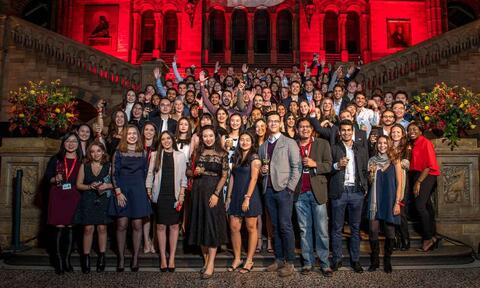Published
Blog type
With five programmes to choose from our Finance Master's programmes, it’s not surprising that this is one of the most frequently asked questions we hear from prospective applicants. Unfortunately, we are unable to advise on individual eligibility without seeing a complete application. However, we can recommend some of the tools available to help you acquire a strong understanding of the entry requirements for the programme you wish to apply to.
We’ve put together this post to help you ensure your profile aligns to the entry requirements for your chosen Finance programme(s):
Academic entry requirements
Each Finance programme has slightly different academic entry requirements and this is due to the level of quantitative knowledge required for each programme. For a more detailed comparison of these programmes please see our comparison table.
Our Finance Masters’ are not conversion programmes. Therefore, if you have any doubts about your quantitative background we recommend taking our online self-assessment maths test to determine your eligibility (this test does not apply to MSc Finance & Accounting, our least quantitative Finance programme).
The academic requirement is an integral requirement to our programmes and is in place to ensure the success of future students on our Finance Masters’. We receive a lot of international applications to these programmes and so the listed recommended academic degree titles are general – it will depend on the individual degree you have studied and number of quantitative modules you have taken as to whether you will ultimately be suitable for the programme you have applied for.
All applicants must meet the minimum academic requirements in full in order to be considered and we do not consider anyone who falls below these requirements, regardless of their GMAT scores, CFA, work experience or anything additional to their application.
English language requirements
Imperial Business School has higher English language requirements to the rest of Imperial London. We also expect all home, EU and overseas applicants to demonstrate English language proficiency – you either will be eligible for an English language interview or will need to provide an English language qualification.
For MSc Finance, MSc Investment & Wealth Management and MSc Financial Technology, if you are eligible for your English to be reviewed via interview, we will do this with your Kira Talent interview assessment.
For MSc Finance & Accounting and MSc Risk Management & Financial Engineering, if you are eligible, we will invite you to attend a Skype interview with one of our Global Skills Consultants. To check if you would be eligible for an English language interview assessment, please see our English language requirements.
You do not need to our meet English language requirements prior to applying; however, if you were to be made an offer for the programme, this would be made conditional on you meeting our English language requirements.
As the Finance programmes are so competitive, submitting an English language qualification with your application which meets our requirements will add weight to your application.
Career planning questions
As part of our assessment for all Finance programmes, your career planning questions and internships/work experience will be considered.
On applications for Finance programmes we would expect to see that you are committed to a career in the finance sector. Your CV and career planning questions are where you can evidence to the Academic Selection Committee that you’ve been building relevant professional experience and knowledge throughout your undergraduate degree. The Finance programmes are highly competitive, and this is the area where you can really make yourself stand out!
Unlike some other MSc programmes, we do not have a limited internship/work experience time frame requirement and we will consider applicants with years of work experience. However, most students on Finance programmes are recent graduates (mostly under three years since graduation). If you are interested in studying at Imperial Business School and have over three years of work experience, you may like to consider our MBA programmes.
GMAT/GRE
GMAT/GRE are not compulsory for any of our Finance Masters’; although, a strong result above the 85th percentile, particularly in the quantitative section, can add weight to your application. GMAT/GRE is highly recommended for candidates from less quantitative degree backgrounds.
If you would like your GMAT/GRE results to be taken into consideration, we recommend you provide the score report at the point that you submit your application. We cannot guarantee that your GMAT/GRE results will be considered if they are not submitted with the rest of your application materials. If you have sat the exam, please attach a scanned copy of the score report with your application.
Indicating additional preferences
When completing your application you will have the opportunity to indicate which other areas of finance are of interest to you. If you are unsuccessful for your selected programme, we will automatically consider you for alternative programmes within the Finance Suite. We will take your area(s) of interest and eligibility into account when considering you for alternative programmes, so make sure you read the entry requirements for each programme carefully. For example, if you are interested in MSc Financial Technology, we will look closely at your experience of programming and computer software packages so you should ensure you provide full details of this in your application.
Other useful resources:
Besides the entry requirements, you also should make sure the programme content aligns to your career goals – we’ve listed some useful resources below:
- Chat to our Finance programme Student Ambassadors online – they will be happy to answer your questions and provide an insight into life at Imperial Business School
- Read our Class Profiles and Student Profiles to understand who is studying on our programmes and what kinds of backgrounds they have
- Attend a recruitment event – at our recruitment events, we often go into more detail on our Finance programmes together and in context of one another
- Research the content of each programme – have a look at our Finance Programme pages on our website and also the Programme Handbooks for this year for an insight into the kinds of modules you could be studying
- Read our Employment Reports for the Finance programmes for an insight into the kind of roles students have gone on to pursue since completing their study at Imperial Business School

We hope you have found the above information insightful and are feeling more comfortable identifying which Finance programme is right for you. We look forward to receiving your applications!


